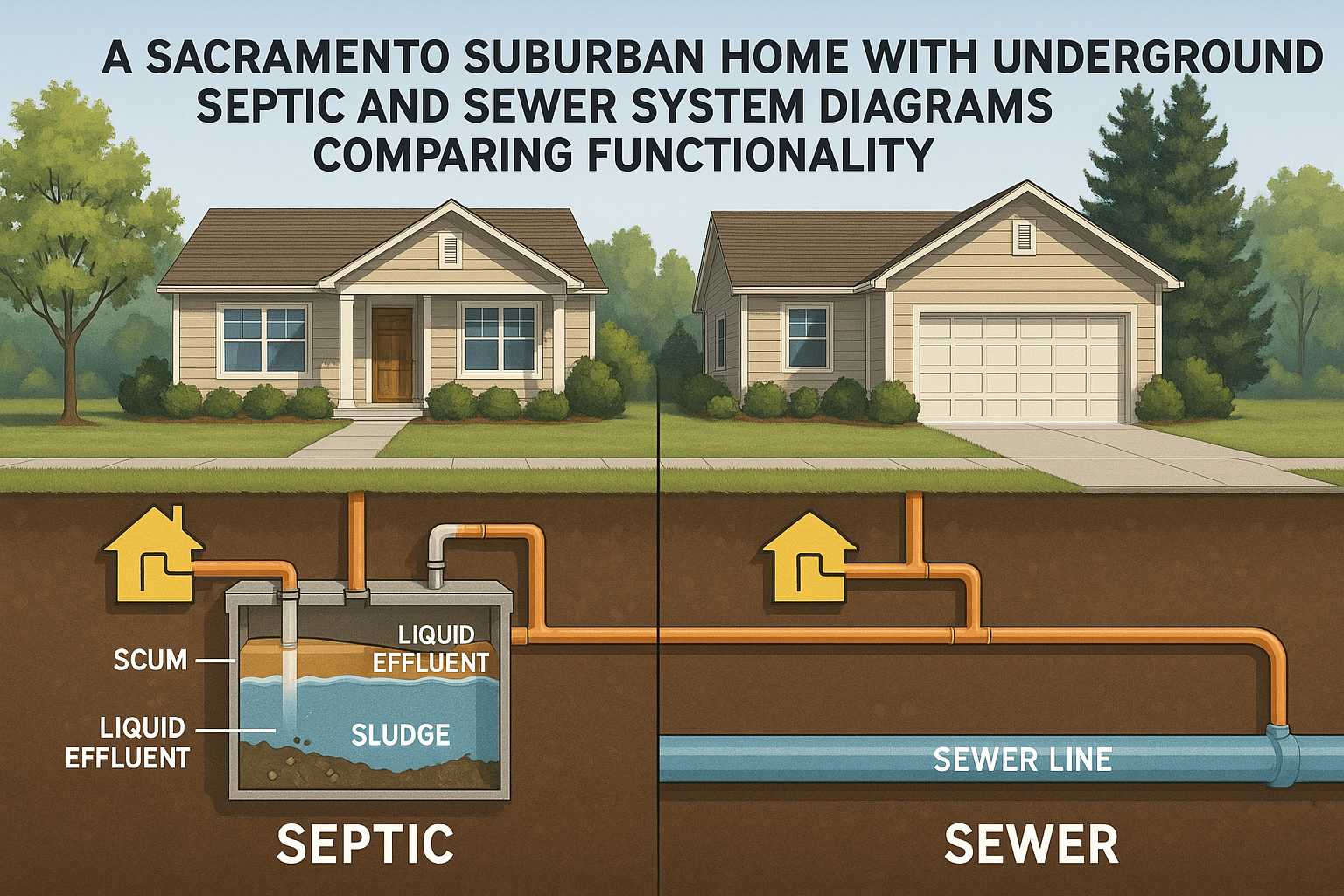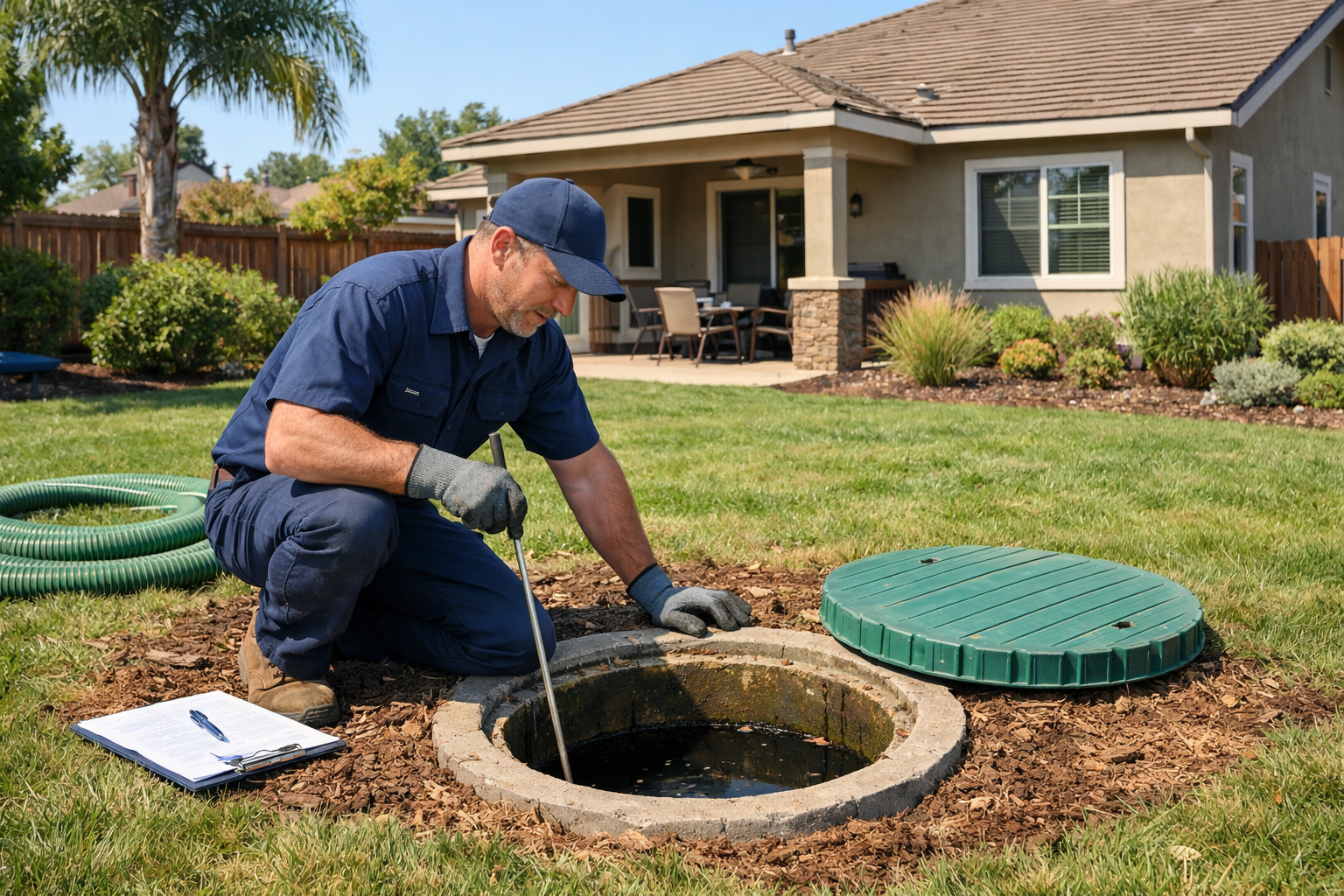Understanding Septic vs Sewer Systems for Sacramento Homes
Ever wondered which system — septic vs sewer — suits your property best? It’s a common debate for Sacramento homeowners, especially those in rural or semi-rural neighborhoods. Both manage wastewater, but their costs, maintenance, and long-term impact on your home can vary dramatically.
Choosing between a septic system vs sewer connection isn’t just about convenience; it’s about sustainability, control, and your property’s future. Many homeowners must decide whether to maintain their septic tank or hook up to a public sewer system.
In this guide, you’ll get a clear breakdown of septic vs sewer system differences, costs, environmental factors, and real-life examples to help you make a confident, informed decision.
What Makes Septic and Sewer Systems Different?
At first glance, both systems handle wastewater — but they operate very differently.
- Septic systems are private, self-contained treatment setups installed on your property.
- Sewer systems connect to a city-managed network that directs wastewater to a central facility for treatment.
Understanding the difference between septic tank vs sewer system setups helps you:
- Plan for long-term maintenance and costs
- Gauge environmental impact
- Estimate property value and resale potential
- Make smarter renovation and expansion choices
Many assume public sewer vs septic systems are always better since they require less homeowner involvement. But for those outside city limits, septic tanks offer independence, lower lifetime costs, and environmental benefits.
Comparing Septic vs Sewer: Which One Suits You Best?
Let’s dig into how septic tank vs public sewer systems perform in real Sacramento scenarios.
How Each System Works
Both manage wastewater, but here’s how they differ:
- Septic System: Wastewater flows into an underground tank where solids settle, and bacteria break down organic matter. The treated liquid disperses into a drain field, filtering naturally through the soil.
- Sewer System: Wastewater travels through municipal pipes to a treatment facility. Homeowners pay monthly fees to maintain the shared infrastructure.
Want to learn more about how septic systems function? Check out How a Septic System Works.
Costs: Installation and Maintenance
Septic System Costs:
- Installation: $5,000–$12,000 in Sacramento
- Maintenance: Pump every 3–5 years ($300–$600)
- Repairs are occasional but can be costly
Sewer Connection Costs:
- Connection: $2,500–$8,000 if a line is nearby
- Ongoing Fees: $30–$70 monthly for city service
- Minimal personal upkeep, though long-term costs are higher
Pro Tip: If your home’s in a remote part of Sacramento County, a septic system may be your only viable choice due to distance from municipal lines.
For septic care, check out Septic Tank Cleaning & Pumping and Lift Station Pumping Services.
Environmental Considerations
Both septic system vs public sewer setups can be eco-friendly when maintained properly.
- Septic systems naturally recycle water locally, enriching groundwater.
- Sewer systems manage large-scale treatment efficiently but consume more energy.
However, neglected septic tanks can leak contaminants — making regular inspections essential. Schedule Septic System Inspections with Full Reports to stay compliant and environmentally responsible.
Property and Lifestyle Fit
Factor
Septic System
Sewer System
Ideal Location
Rural or suburban areas
Urban neighborhoods
Maintenance
Homeowner responsibility
City-managed
Monthly Fees
Low to none
Continuous utility fees
Installation
Higher upfront
Moderate if nearby line
Independence
Complete
Shared system
Environmental Impact
Localized
Centralized
For larger properties in Sacramento County, septic systems provide freedom and flexibility. But for city sewer vs septic setups, connecting to the Sacramento Regional County Sanitation District often makes sense within city limits.
Evaluating Costs, Maintenance, and Longevity in Sacramento
System Setup and Installation in Sacramento
Installing a septic system requires soil testing, design approval, and professional installation — a one-time but upfront investment. Meanwhile, connecting to the public sewer vs septic tank system is simpler if your home is close to an existing line.
If you’re planning an installation, you may also need help with Septic Risers & Lid Installation or Tank Locating & Outlet Baffle Replacement.
Routine Maintenance for Both Systems
- Septic: Pump every 3–5 years, inspect annually.
- Sewer: Minimal homeowner maintenance, though occasional blockages can occur.
Homeowners who stay consistent with maintenance save thousands over the lifespan of their system.
Long-Term Cost Outlook
Over 20 years, septic homeowners often spend less overall since there are no recurring sewer bills. Sewer-connected homes, on the other hand, offer predictable payments and less hands-on upkeep.
Sites like HomeAdvisor, Angi, and The Spruce provide more insights into average septic and sewer costs nationwide.
Real-World Use Cases: When Each System Makes Sense
Picture three Sacramento homeowners:
- Case 1: A suburban Elk Grove resident connects to the city sewer vs septic option for ease and reliability. They enjoy predictable fees and low maintenance.
- Case 2: A Wilton homeowner chooses a private sewer vs septic setup with a self-managed system. Despite higher installation costs, they gain long-term savings and autonomy.
- Case 3: An eco-conscious Fair Oaks family maintains their septic tank vs sewer system using biodegradable products to protect groundwater.
Each scenario shows that the right system depends on property location, lifestyle, and environmental values.
Tips and Common Mistakes to Avoid When Choosing
Choosing between septic vs sewer system options doesn’t have to be stressful. Keep these insights in mind:
- Know your soil: Sacramento County requires percolation testing before installing a septic system.
- Budget smart: Septic systems save money over time, but neglect can lead to expensive repairs.
- Flush wisely: Avoid chemicals and wipes — they harm both septic bacteria and sewer pipes.
- Consult pros: Local experts like Blue Ribbon Septic can test your soil and recommend the best fit.
- Think resale: Buyers in urban areas often prefer sewer connections; rural buyers appreciate septic independence.
For further reading, you can explore expert resources from EPA.gov and Forbes on wastewater management standards.
Final Thoughts: Making the Right Choice for Your Property
Ultimately, the septic vs sewer decision comes down to your property’s location, your budget, and your long-term goals.
Septic systems offer freedom, sustainability, and cost efficiency. Sewer systems deliver simplicity and reliability.
Before deciding, evaluate:
- Installation and maintenance costs
- Environmental footprint
- Proximity to sewer lines
- Future resale value
If you’re in Sacramento, consult Blue Ribbon Septic for soil testing, maintenance plans, or system health assessments to find your ideal wastewater solution.
Frequently Asked Questions About Septic vs Sewer
1. Is a septic system cheaper than a sewer system in the long run?
Yes. Over time, septic systems often cost less since they don’t include recurring city sewer fees — though consistent maintenance is essential.
2. How often should a septic tank be pumped in Sacramento?
Experts recommend every 3–5 years, depending on household size and water use.
3. Can I switch from septic to sewer in Sacramento?
Yes, if your property is close to a municipal line. A professional can determine connection feasibility and permit requirements.
4. Which system is more eco-friendly?
Properly maintained septic systems are eco-friendly because they recycle water locally. Sewer systems are efficient but rely on more energy-intensive infrastructure.
5. What’s the best option for rural Sacramento homes?
A septic tank vs sewer system is often the only and most practical choice for rural homes outside municipal service areas.






